人教英语七年级下册Unit 4 Don’t eat in class. Section A (1a-1c)(共35张PPT)
文档属性
| 名称 | 人教英语七年级下册Unit 4 Don’t eat in class. Section A (1a-1c)(共35张PPT) |
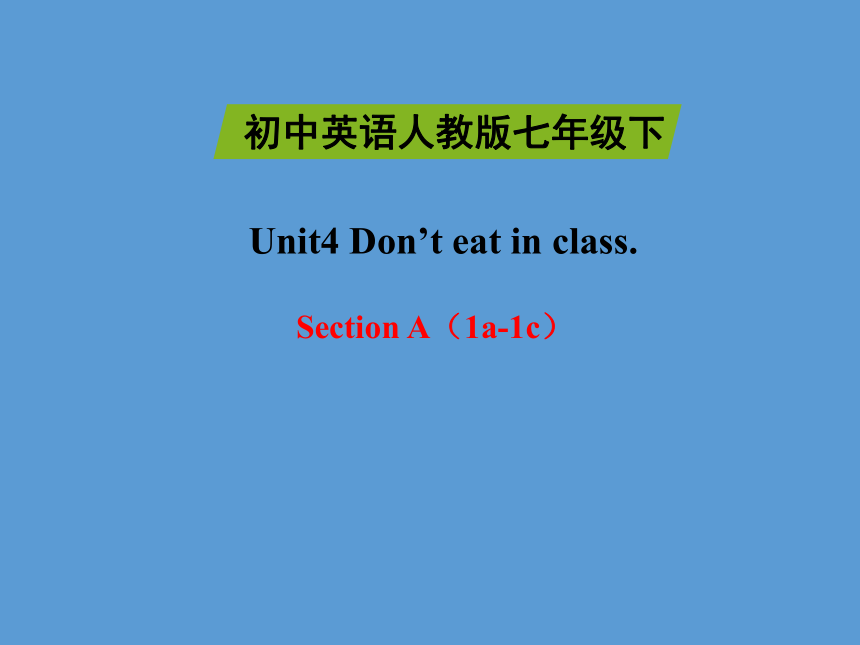
|
|
| 格式 | zip | ||
| 文件大小 | 1.4MB | ||
| 资源类型 | 教案 | ||
| 版本资源 | 人教新目标(Go for it)版 | ||
| 科目 | 英语 | ||
| 更新时间 | 2020-03-16 00:00:00 | ||
图片预览

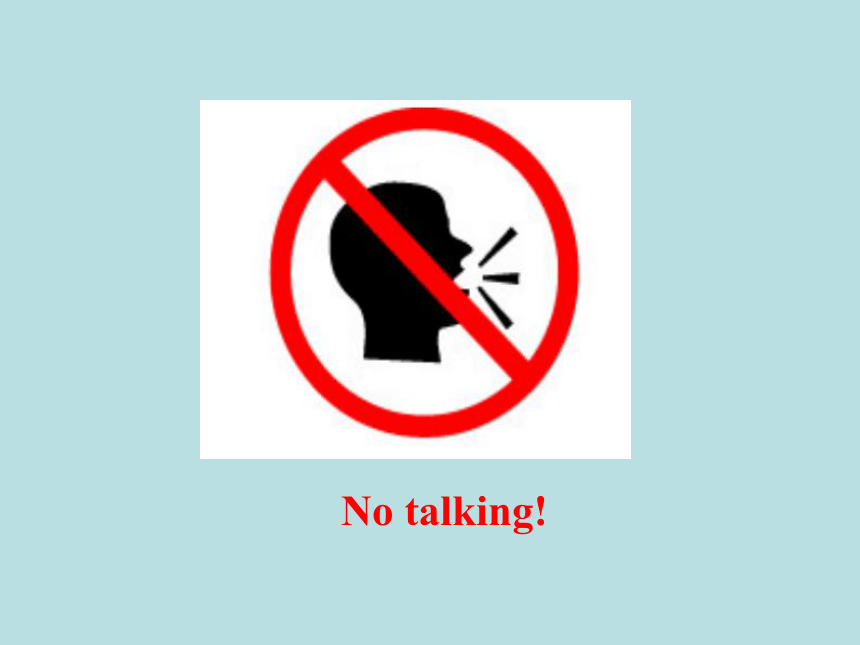

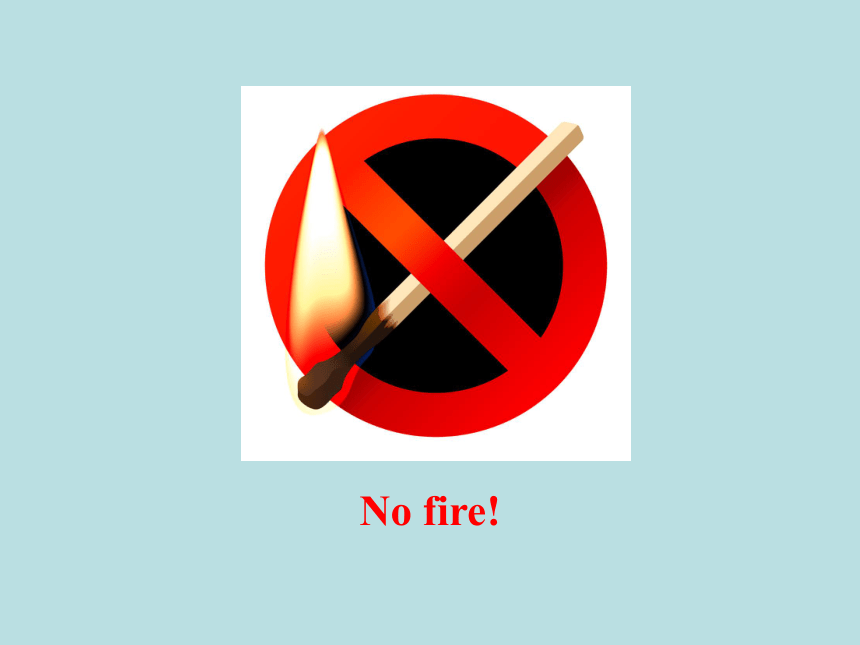
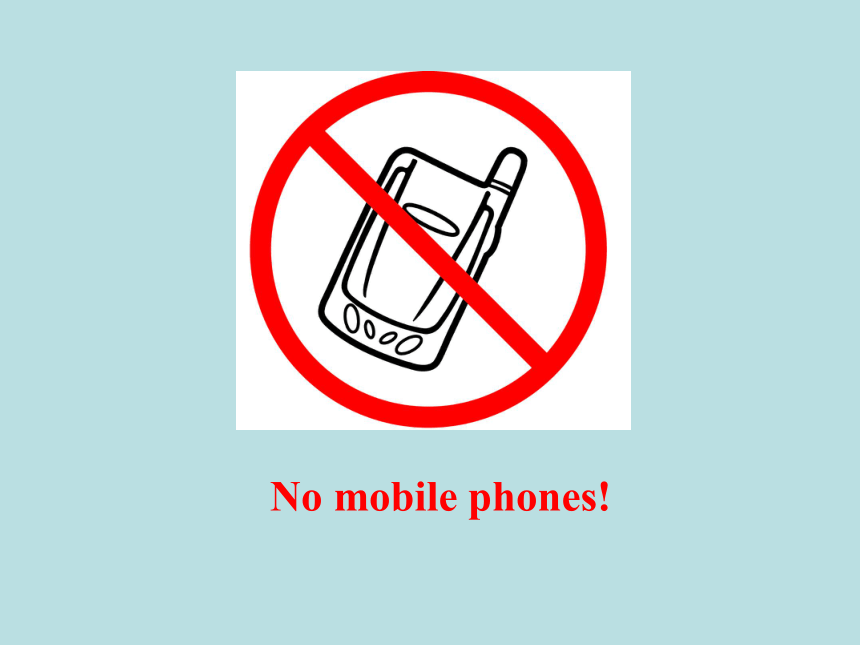
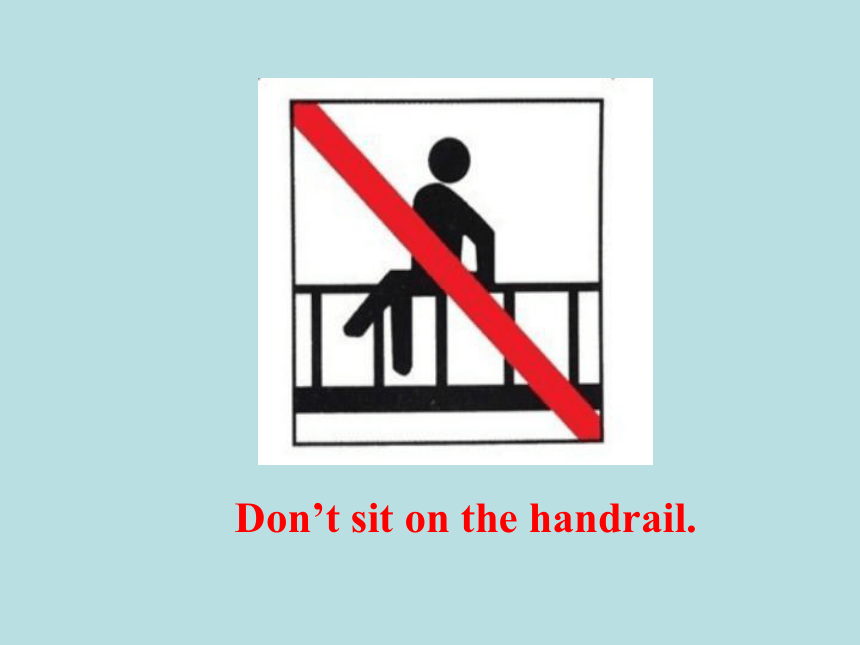
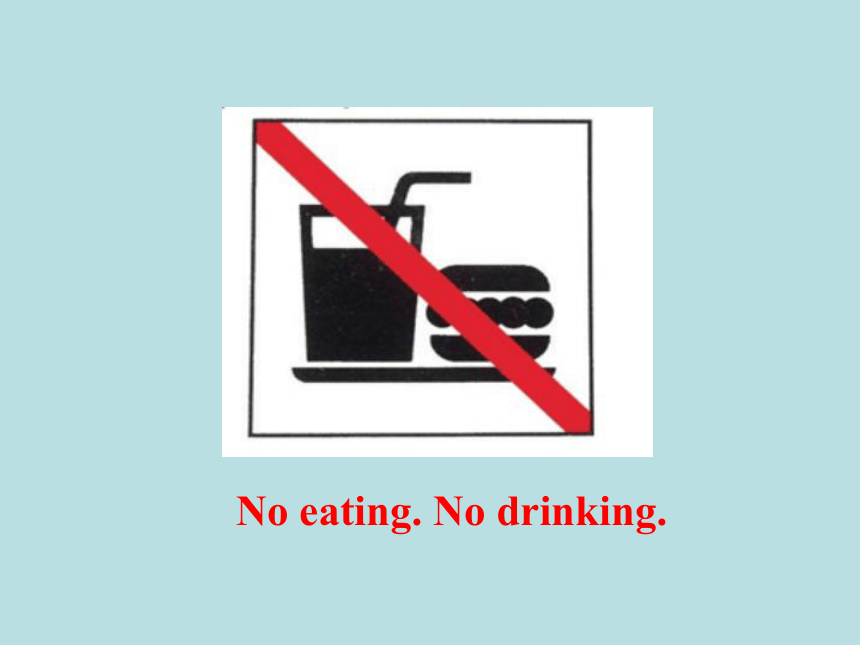
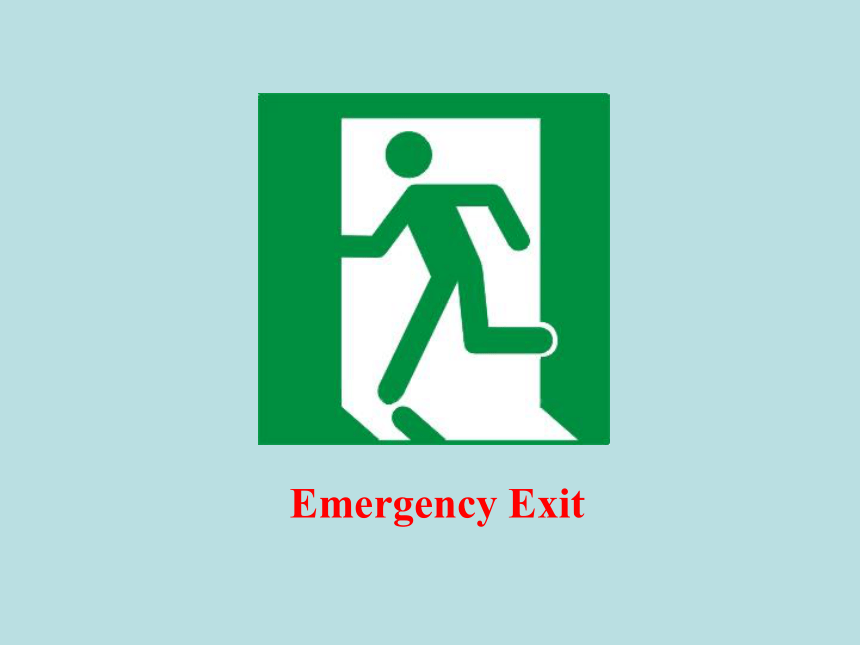
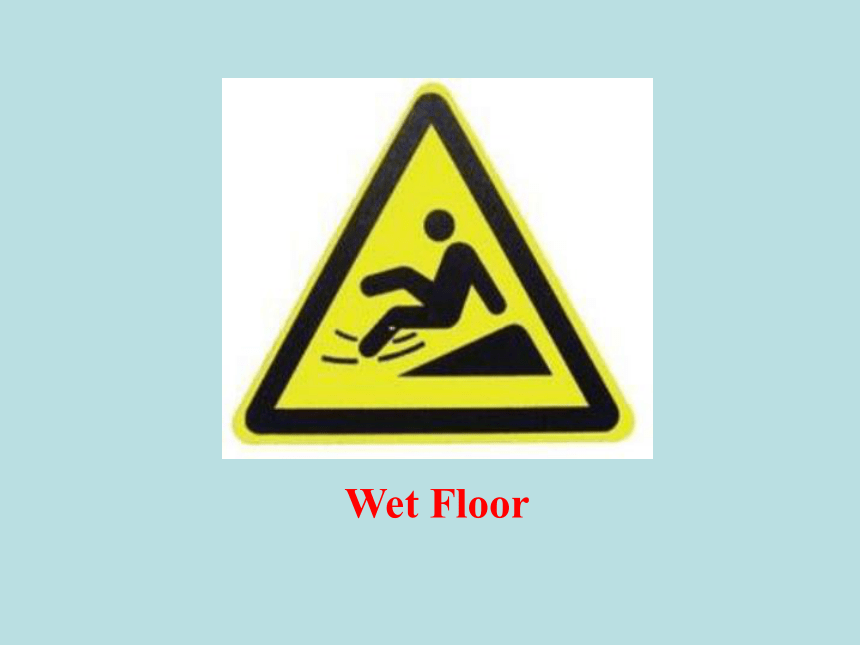
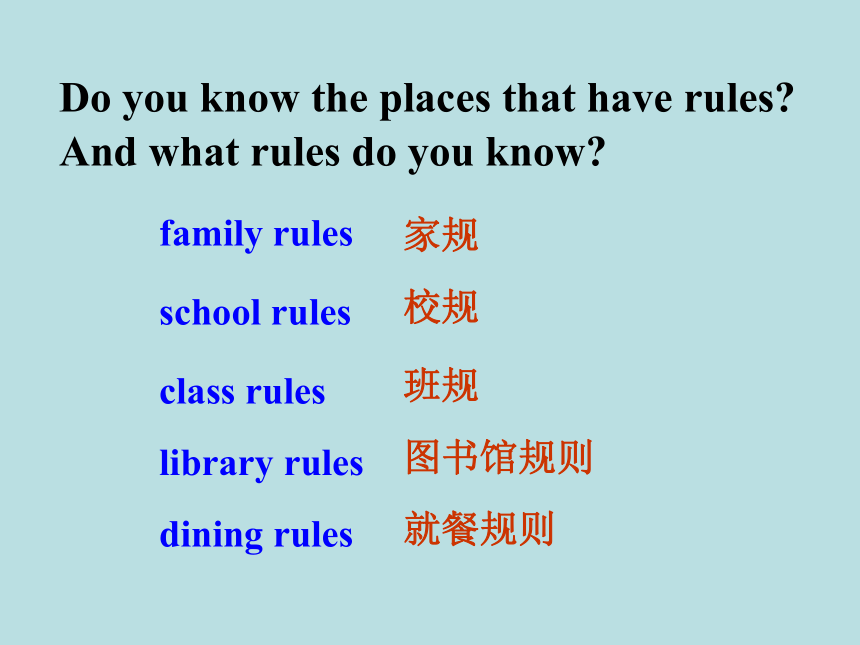
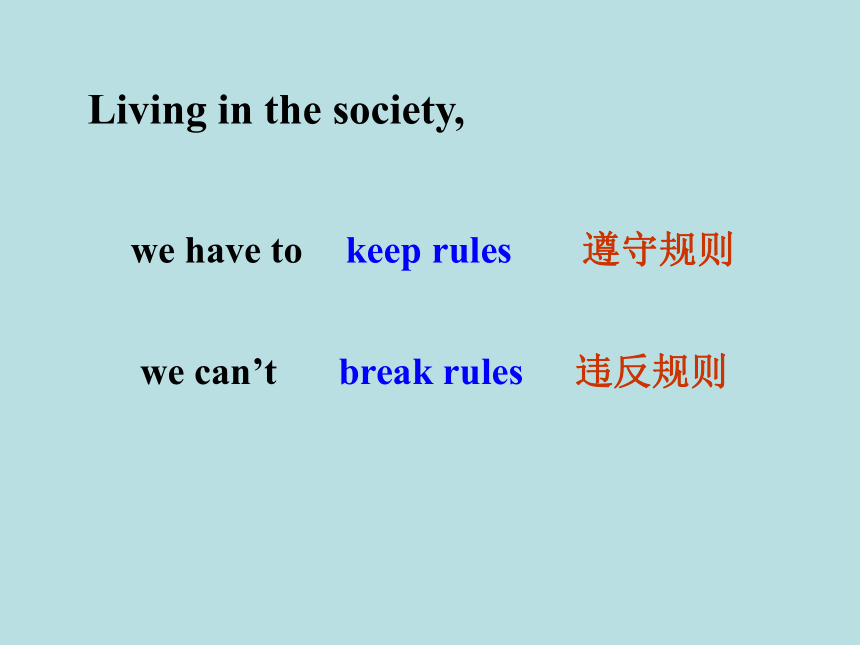
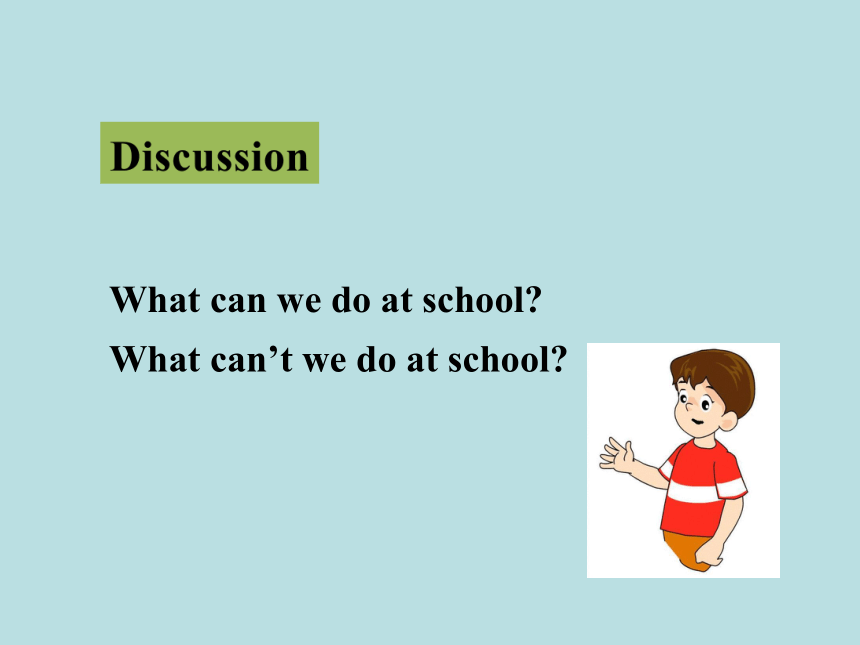
文档简介
(共35张PPT)
Unit4 Don’t eat in class.
Section A(1a-1c)
No talking!
No visitors!
No?fire!
No mobile phones!
Don’t sit on the handrail.
No eating. No drinking.
Emergency Exit
Wet Floor
Do you know the places that have rules? And what rules do you know?
school rules
class rules
family rules
library rules
dining rules
校规
班规
图书馆规则
就餐规则
家规
keep rules
break rules
遵守规则
违反规则
Living in the society,
we have to
we can’t
What can we do at school?
What can’t we do at school?
be late for class = arrive late for class
A: Can we be late for class?
B: No, we can’t. We can’t be late for class.
Don’t be late for class.
Presentation
Don’t eat in the classrooms.
A: Can we eat in the classrooms?
B: No, we can’t. We can’t eat in the classrooms.
We can eat in the dining hall.
A: Can we eat in the dining hall?
B: Yes, we can eat in the dining hall.
.
A: Can we run in the hallways?
B: No, we can’t. We can’t run in the
hallways.
Don’t run in the hallways.
A: Can you fight?
B: No, We can’t. We can’t fight.
Don’t fight.
A: Can we play it in the classrooms?
B: No, we can’t. But we can play it outside.
Don’t play sports in the classrooms.
Play sports outside.
Which rules are these students breaking? Write the number of the rule next to the student.
SCHOOL RULES
1. Don’t arrive late for class. You must be on time.
2. Don’t run in the hallways.
3. Don’t eat in the classroom. You must eat in the dining hall.
4. Don’t listen to music in class.
5. Don’t fight.
1. Don’t arrive late for class.不要上课迟到。
arrive vi. 到达
When did he arrive yesterday?
昨天他什么时候到达的?
Language points
【拓展】arrive in / at与get to 的区别
arrive + in (大地方)
at (小地方)
get 必须与to 搭配才能加宾语。后面如接地点副词,则不用介词to。
My father arrived in / got to Beijing this morning.
我爸爸今天上午到达了北京。
The farmer arrived at / got to an old house and
knocked at the door.
那个农民到达了一个旧房子前并且敲了敲门。
【例句】
2. You must be on time.
你们必须守时。
1) must 作为情态动词,表示“必须”、“务必”,有时还表示“一定”,起到加强语气的作用。例如:
You must come tomorrow.你(们)明天必须要来。
在回答must引起的问句时,如果是否定的答复,可用don’t have to或needn’t (不必) , 但不能用mustn’t (一定不, 必须不, 不允许, 不得) 。
2) on time 是一个固定介词短语,表示“按时;准时”。 例如:
We must get to school on time.
我们必须按时到校。
我们要按时完成任务。
We'll finish our job _________.
on time
3) 系动词be与形容词或介词短语连用,是英语一种常见的语句结构,表示某种状态。例如:
be quiet 保持安静;be strict 要求严格
be on time 守时;按时到;
be at work 在上班
例如:
You mustn’t be noisy, children.
孩子们,你们一定不可喧闹。
3. Don’t listen to music in class.
别在课上听音乐。
listen to … 听……
She is listening to the radio.
她在听收音机。
listen at the door 耳朵贴着门听
listen for … 留神等着听…
listen for an answer 等着听回答
listen to a lecture 听讲座
listen to advice 听从劝告
4. wear a hat 戴帽子
wear v. 穿;戴
The girl often wears a red coat and a white hat.
这个女孩经常穿着红色的外套戴着白色的帽子。
wear强调“穿着”这一状态,也可表示“戴着”。如:
She likes wearing colorful clothes.
她喜欢穿着颜色鲜艳的衣服。
dress既可表示动作,又可表示状态,常由人作宾语,意为“给……穿衣服”。
如:Could you dress the child for me?
你能不能替我给小孩穿上衣服?
【拓展】wear, dress 与 put on的区别
put on着重于“穿”这一动作,即由没穿到穿这一过程的完成,意为“穿上”。如:
Please put on your new coat.
请穿上你的新大衣。
用 wear, put on, dress 的适当形式填空。
She is _________ a red flower in her hair.
2. He ________ his coat and goes out.
3. He is _________ black.
wearing
puts on
dressed in
5. Can we bring music players to school?
我们能把音乐播放机带到学校来吗?
bring v. 带来;取来
Can you bring me an English dictionary?
你能给我带来一本英语字典吗?
【拓展】bring 与 take 的区别
Bring your homework here, and take the book away.
把你的作业拿过来,把这本书带走。
bring 指往里带,而take 则指往外带。
---Why do Chinese people like red?
---Because they think it can ____ them good luck.
A. carry B. bring C. make D. take
B
1.祈使句是表示命令、叮嘱、号召等的句子;
2.通常省略主语you;
3.句中谓语动词用动词原形;
4.祈使句有肯定和否定两种。
Don’t eat in class.
Come in, please! 请进!
Sit down, please. 请坐。
Don’t play sports in the classroom.
Don’t fight .
否定
肯定
肯定祈使句 否定祈使句
Sit down.
Come in.
Eat at home.
Listen to music outside.
5. Do your homework at school.
Don’t sit down.
Don’t come in .
Don’t eat at home.
Don’t listen to music outside.
Don’t do your homework at school.
Examples
1.—When did your uncle ______ in Shanghai?
—The day before yesterday.
A. arrive B. get
2. If you _____ too late, the host will be unhappy.
A. arrive B. get to C. arrive at
A
A
Exercise
— ______ ask you some questions?
—Sure.
A. Do you B. Will you
C. Can I D. Must I
—Dad, may I watch TV?
—No, you can’t. You _______ finish your homework first.
A. must B. can C. may
C
A
School rules
1. Don’t arrive late for class.
2. Don’t run in the hallways.
3. Don’t eat in the classrooms.
4. Don’t listen to music in the classrooms or the hallways.
5. Don’t fight.
Unit4 Don’t eat in class.
Section A(1a-1c)
No talking!
No visitors!
No?fire!
No mobile phones!
Don’t sit on the handrail.
No eating. No drinking.
Emergency Exit
Wet Floor
Do you know the places that have rules? And what rules do you know?
school rules
class rules
family rules
library rules
dining rules
校规
班规
图书馆规则
就餐规则
家规
keep rules
break rules
遵守规则
违反规则
Living in the society,
we have to
we can’t
What can we do at school?
What can’t we do at school?
be late for class = arrive late for class
A: Can we be late for class?
B: No, we can’t. We can’t be late for class.
Don’t be late for class.
Presentation
Don’t eat in the classrooms.
A: Can we eat in the classrooms?
B: No, we can’t. We can’t eat in the classrooms.
We can eat in the dining hall.
A: Can we eat in the dining hall?
B: Yes, we can eat in the dining hall.
.
A: Can we run in the hallways?
B: No, we can’t. We can’t run in the
hallways.
Don’t run in the hallways.
A: Can you fight?
B: No, We can’t. We can’t fight.
Don’t fight.
A: Can we play it in the classrooms?
B: No, we can’t. But we can play it outside.
Don’t play sports in the classrooms.
Play sports outside.
Which rules are these students breaking? Write the number of the rule next to the student.
SCHOOL RULES
1. Don’t arrive late for class. You must be on time.
2. Don’t run in the hallways.
3. Don’t eat in the classroom. You must eat in the dining hall.
4. Don’t listen to music in class.
5. Don’t fight.
1. Don’t arrive late for class.不要上课迟到。
arrive vi. 到达
When did he arrive yesterday?
昨天他什么时候到达的?
Language points
【拓展】arrive in / at与get to 的区别
arrive + in (大地方)
at (小地方)
get 必须与to 搭配才能加宾语。后面如接地点副词,则不用介词to。
My father arrived in / got to Beijing this morning.
我爸爸今天上午到达了北京。
The farmer arrived at / got to an old house and
knocked at the door.
那个农民到达了一个旧房子前并且敲了敲门。
【例句】
2. You must be on time.
你们必须守时。
1) must 作为情态动词,表示“必须”、“务必”,有时还表示“一定”,起到加强语气的作用。例如:
You must come tomorrow.你(们)明天必须要来。
在回答must引起的问句时,如果是否定的答复,可用don’t have to或needn’t (不必) , 但不能用mustn’t (一定不, 必须不, 不允许, 不得) 。
2) on time 是一个固定介词短语,表示“按时;准时”。 例如:
We must get to school on time.
我们必须按时到校。
我们要按时完成任务。
We'll finish our job _________.
on time
3) 系动词be与形容词或介词短语连用,是英语一种常见的语句结构,表示某种状态。例如:
be quiet 保持安静;be strict 要求严格
be on time 守时;按时到;
be at work 在上班
例如:
You mustn’t be noisy, children.
孩子们,你们一定不可喧闹。
3. Don’t listen to music in class.
别在课上听音乐。
listen to … 听……
She is listening to the radio.
她在听收音机。
listen at the door 耳朵贴着门听
listen for … 留神等着听…
listen for an answer 等着听回答
listen to a lecture 听讲座
listen to advice 听从劝告
4. wear a hat 戴帽子
wear v. 穿;戴
The girl often wears a red coat and a white hat.
这个女孩经常穿着红色的外套戴着白色的帽子。
wear强调“穿着”这一状态,也可表示“戴着”。如:
She likes wearing colorful clothes.
她喜欢穿着颜色鲜艳的衣服。
dress既可表示动作,又可表示状态,常由人作宾语,意为“给……穿衣服”。
如:Could you dress the child for me?
你能不能替我给小孩穿上衣服?
【拓展】wear, dress 与 put on的区别
put on着重于“穿”这一动作,即由没穿到穿这一过程的完成,意为“穿上”。如:
Please put on your new coat.
请穿上你的新大衣。
用 wear, put on, dress 的适当形式填空。
She is _________ a red flower in her hair.
2. He ________ his coat and goes out.
3. He is _________ black.
wearing
puts on
dressed in
5. Can we bring music players to school?
我们能把音乐播放机带到学校来吗?
bring v. 带来;取来
Can you bring me an English dictionary?
你能给我带来一本英语字典吗?
【拓展】bring 与 take 的区别
Bring your homework here, and take the book away.
把你的作业拿过来,把这本书带走。
bring 指往里带,而take 则指往外带。
---Why do Chinese people like red?
---Because they think it can ____ them good luck.
A. carry B. bring C. make D. take
B
1.祈使句是表示命令、叮嘱、号召等的句子;
2.通常省略主语you;
3.句中谓语动词用动词原形;
4.祈使句有肯定和否定两种。
Don’t eat in class.
Come in, please! 请进!
Sit down, please. 请坐。
Don’t play sports in the classroom.
Don’t fight .
否定
肯定
肯定祈使句 否定祈使句
Sit down.
Come in.
Eat at home.
Listen to music outside.
5. Do your homework at school.
Don’t sit down.
Don’t come in .
Don’t eat at home.
Don’t listen to music outside.
Don’t do your homework at school.
Examples
1.—When did your uncle ______ in Shanghai?
—The day before yesterday.
A. arrive B. get
2. If you _____ too late, the host will be unhappy.
A. arrive B. get to C. arrive at
A
A
Exercise
— ______ ask you some questions?
—Sure.
A. Do you B. Will you
C. Can I D. Must I
—Dad, may I watch TV?
—No, you can’t. You _______ finish your homework first.
A. must B. can C. may
C
A
School rules
1. Don’t arrive late for class.
2. Don’t run in the hallways.
3. Don’t eat in the classrooms.
4. Don’t listen to music in the classrooms or the hallways.
5. Don’t fight.
同课章节目录
- Unit 1 Can you play the guitar?
- Section A
- Section B
- Unit 2 What time do you go to school?
- Section A
- Section B
- Unit 3 How do you get to school?
- Section A
- Section B
- Unit 4 Don't eat in class.
- Section A
- Section B
- Unit 5 Why do you like pandas?
- Section A
- Section B
- Unit 6 I'm watching TV.
- Section A
- Section B
- Review of Units 1-6
- Unit 7 It's raining!
- Section A
- Section B
- Unit 8 Is there a post office near here?
- Section A
- Section B
- Unit 9 What does he look like?
- Section A
- Section B
- Unit 10 I'd like some noodles.
- Section A
- Section B
- Unit 11 How was your school trip?
- Section A
- Section B
- Unit 12 What did you do last weekend?
- Section A
- Section B
